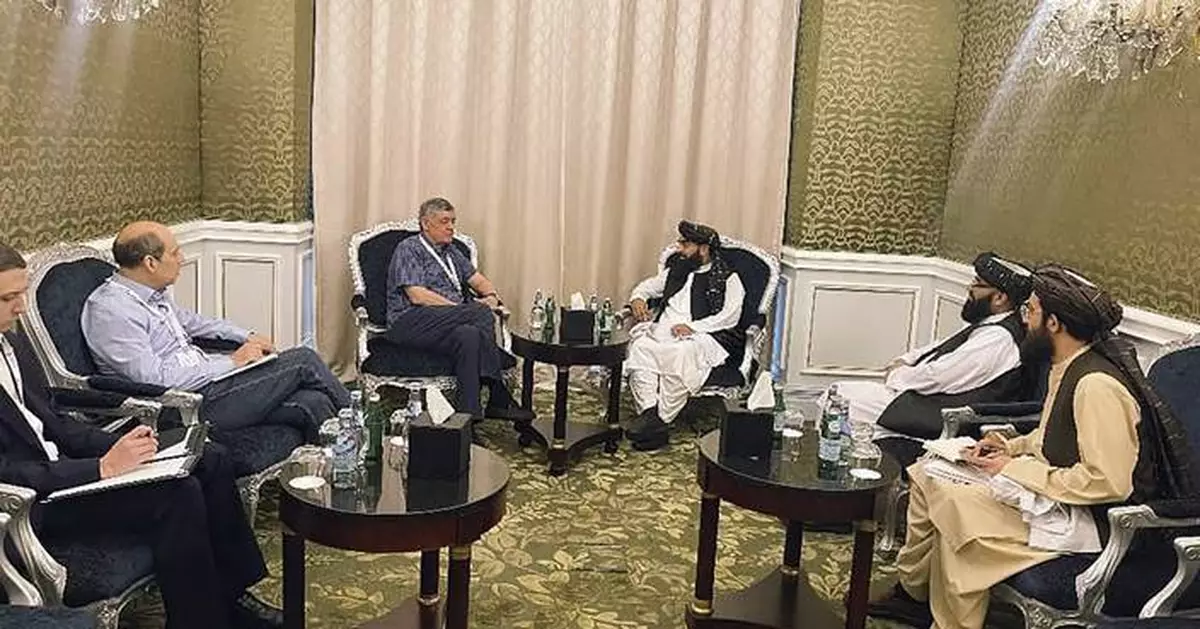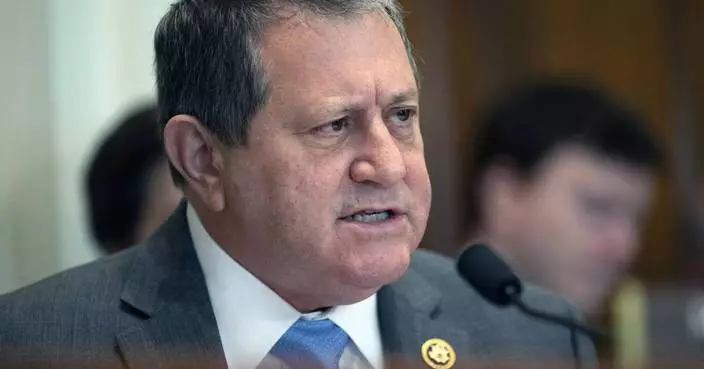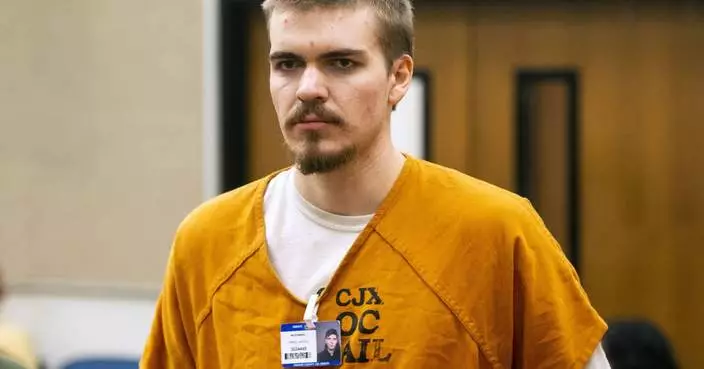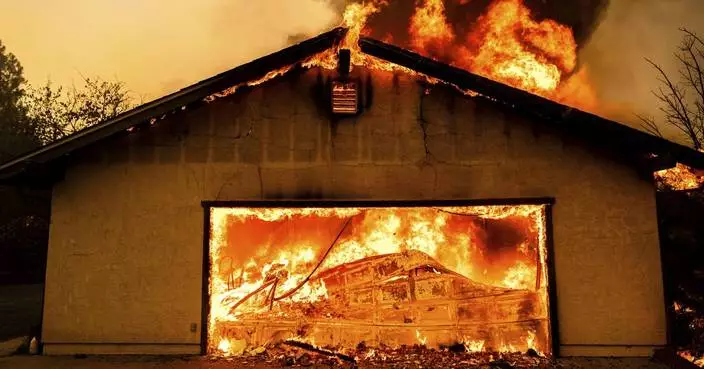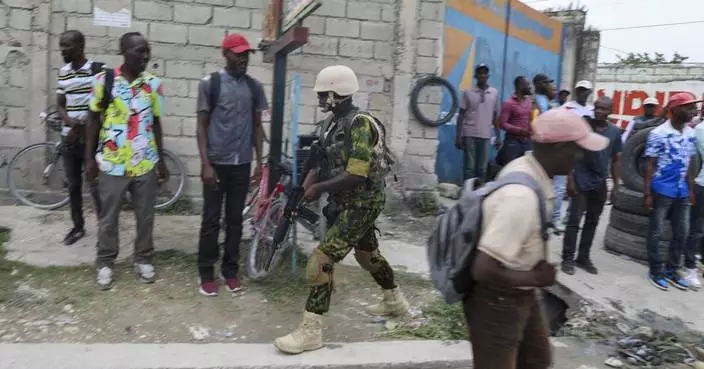ISLAMABAD (AP) — A United Nations-led meeting held in Qatar with the Taliban on increasing engagement with Afghanistan does not translate into a recognition of their government, a U.N. official said Monday.
The gathering on Sunday and Monday in Qatar's capital of Doha with envoys from some two dozen countries was the first time that representatives of the Afghan Taliban administration attended such a U.N.-sponsored meeting.
The Taliban were not invited to the first meeting, and U.N. Secretary-General Antonio Guterres said they set unacceptable conditions for attending the second one, in February, including demands that Afghan civil society members be excluded from the talks and that the Taliban be treated as the country’s legitimate rulers.
Ahead of Doha, representatives of Afghan women were excluded from attending, paving the way for the Taliban to send their envoys — though the organizers insisted that demands for women’s rights would be raised.
“I would like to emphasize that this meeting and this process of engagement does not mean normalization or recognition,” Rosemary A. DiCarlo, a U.N. official for political and peacebuilding affairs said Monday.
“My hope is that the constructive exchanges on the various issues over the last two days have moved us a little closer to resolving some of the problems that are having such a devastating impact on the Afghan people,” she added.
Zabihullah Mujahid, chief Taliban government spokesman who headed the delegation to Doha, said there was an opportunity for them to meet with representatives of various countries on the sidelines of the gathering.
He added that the messages from the Taliban “reached all participating” countries at the meeting. Afghanistan needs cooperation with the private sector and in the fight against drugs, he also said. “Most countries expressed their willingness to cooperate in these areas.”
The talks took place behind closed doors with no media access. But that didn’t stop the Taliban delegation from posting videos of the sessions on the social media platform X featuring their officials.
Michael Kugelman, director of the Wilson Center’s South Asia Institute, said the Taliban got what they wanted from the Doha gathering because they discussed the issues that mattered to them the most and the meeting excluded those they didn’t want at the table.
The talks also shielded the Taliban from much of the vitriol directed at the meeting, given that so much of the anger targeted the U.N. for excluding Afghan women, and not the Taliban for being there, he said.
“The Taliban played their cards well. Their conditions were met and they took full advantage with a major PR blitz targeting audiences at home and abroad.”
With images and interviews and statements, the Taliban projected the narrative of their officials engaging with the world and conveying the idea that the Taliban are not the pariahs their critics want them to be, he said.
Nobody from the Taliban delegation was immediately available for comment about the Doha talks, the most high-profile and high-level international meeting they've attended since seizing power in 2021.
No country officially recognizes the Taliban and the U.N. has said that recognition remains practically impossible while bans on female education and employment remain in place.
However, some participants, including Canada, expressed disappointment over the exclusion of women and civil society representatives.
"Canada is extremely disappointed that the U.N. organizers have excluded non-Taliban Afghan participants, including women’s advocates, religious and ethnic minorities, and human rights groups from participating in the meeting’s main sessions,” David Sproule, Canada’s special representative for Afghanistan, said in a statement.
DiCarlo, the U.N. official, said that "while women and civil society were not sitting across the table form the de facto (Taliban) authorities in last two days, we made their voices heard ... civil society has a rightful role to play in shaping Afghanistan’s future.”
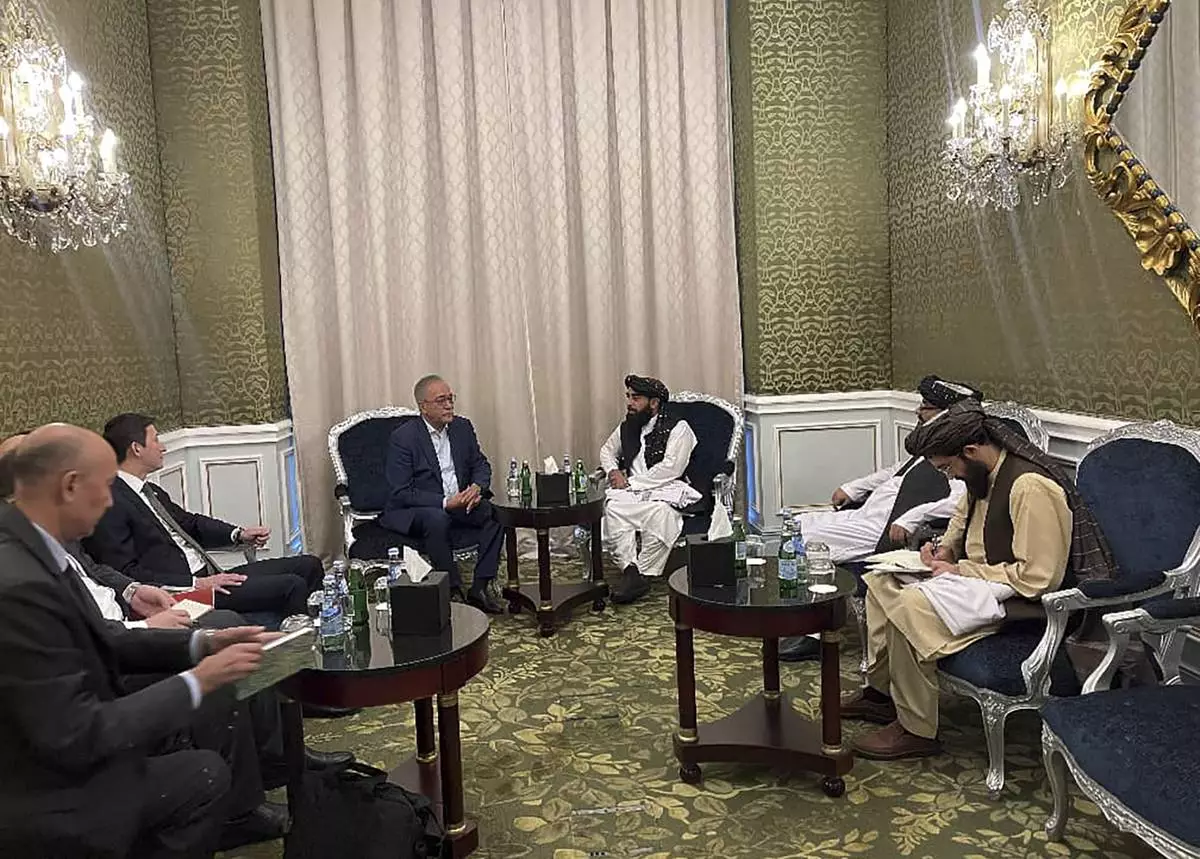
In this photo released by the Taliban Spokesman Office, Zabihullah Mujahid, the chief spokesman for the Taliban government who leads the Taliban delegation, center right, speaks with Uzbekistan Presidential Envoy to Afghanistan Ismatullah Irgashev, during a meeting in Doha, Qatar, Sunday, June 30, 2024. A Taliban delegation is attending a United Nations-led meeting in Qatar on Afghanistan after organizers said women would be excluded from the gathering. The two-day meeting is the third U.N.-sponsored gathering on the Afghan crisis. (Taliban Spokesman Office via AP)
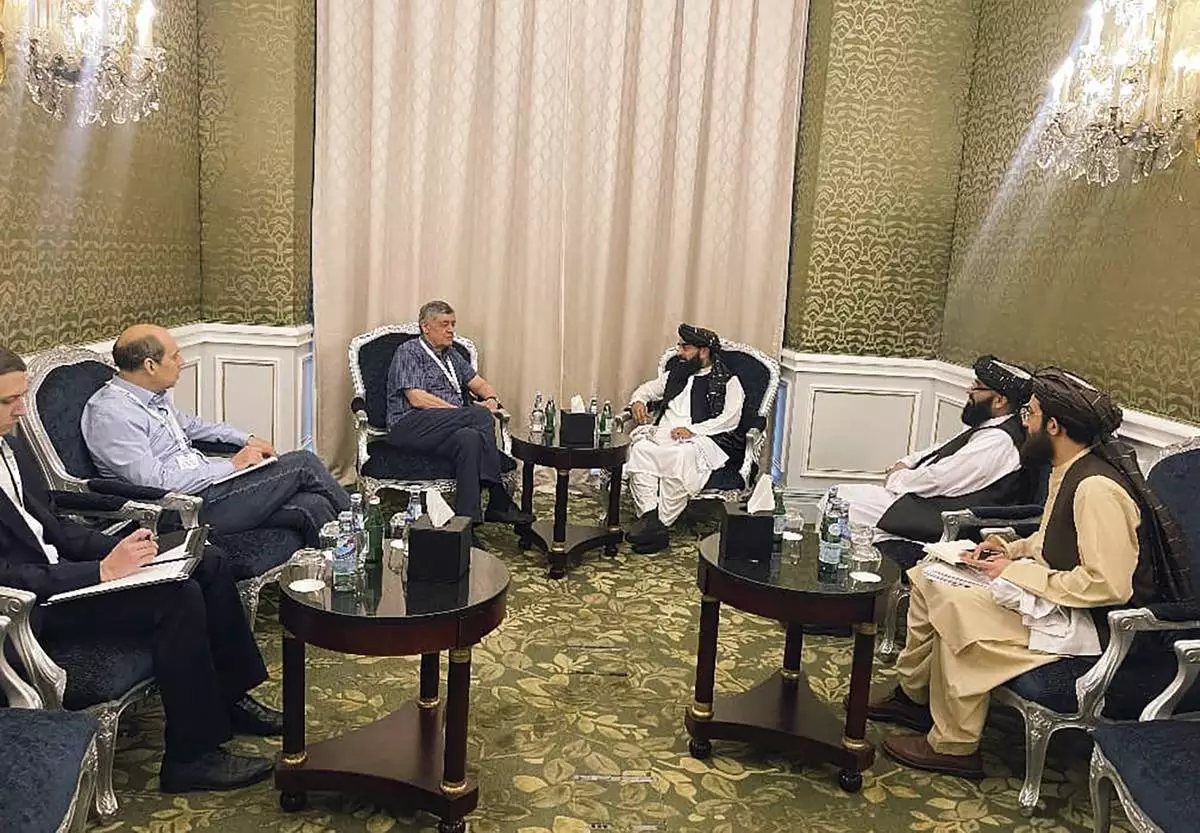
In this photo released by the Taliban Spokesman Office, Zabihullah Mujahid, the chief spokesman for the Taliban government who leads the Taliban delegation, center right, speaks with Russian Presidential Envoy to Afghanistan Zamir Kabulov, during a meeting in Doha, Qatar, Sunday, June 30, 2024. A Taliban delegation is attending a United Nations-led meeting in Qatar on Afghanistan after organizers said women would be excluded from the gathering. The two-day meeting is the third U.N.-sponsored gathering on the Afghan crisis. (Taliban Spokesman Office via AP)
WASHINGTON (AP) — President Joe Biden's conduct behind closed doors, in the Oval Office, on Air Force One and in meetings around the world is described in the same dual way by those who regularly see him in action.
He is often sharp and focused. But he also has moments, particularly later in the evening, when his thoughts seem jumbled and he trails off mid-sentence or seems confused. Sometimes he doesn't grasp the finer points of details. He occasionally forgets people's names, stares blankly and moves slowly around the room.
Biden’s occasional struggles with focus may not be unusual for someone his age. But at 81 years old and seeking another four years in the White House, the moments when he’s off his game have taken on a fresh resonance following his disastrous debate performance against Republican Donald Trump. The president appeared pale, gave nonsensical answers, stared blankly and lost his train of thought.
The June 27 faceoff alarmed Democrats and his financial backers, in part, because Biden seemed so much worse than during the almost routine moments when he’s less sharp. And that has raised questions about whether he’s up for a campaign that’s only going to get nastier and whether he can effectively govern for another four years if he wins.
“We understand the concerns. We get it,” White House press secretary Karine Jean-Pierre said this week. But she insisted Biden has no intention of stepping away from the campaign. “The president is clear-eyed and he is staying in the race.”
But there have been other notable signs in recent weeks, from Biden’s constrained itinerary during a recent visit to France to his flat demeanor during a big-dollar Hollywood fundraiser with top stars.
This story is based on interviews with two dozen people who have spent time with the president privately, some of whom were granted anonymity to discuss interactions that were not intended to be public.
The way Biden acts in private, according to regular observers, often tracks how he comes off publicly. In both settings, he can be commanding one day and halting another.
A day after his debate blunder, Biden's voice at a North Carolina rally was forceful, his eyes alert, his delivery confident. As he spoke, cheers filled the room.
“I give you my word as a Biden. I would not be running again if I didn’t believe with all my heart and soul I can do this job,” he told supporters. “Because, quite frankly, the stakes are too high.”
But sometimes, Biden speaks so softly that it is difficult to make out his words even with a microphone. He'll stop mid-sentence and trail off during speeches. At other times he runs the room, leading the audience, joking and shaking hands with thrilled supporters, in clear command of the moment. His gait is often stiff, but sometimes he jogs.
His State of the Union speech earlier this year was widely seen as a confident and fiery speech that showed he was ready to take on Trump.
Through it all, public concern about Biden's fitness for another four years has been persistent. In an August 2023 poll from The Associated Press-NORC Center for Public Affairs Research, fully 77% of U.S. adults said Biden was too old to be effective for four more years. Not only did 89% of Republicans say that, but so did 69% of Democrats.
One person who spends time with Biden regularly said there have been visible signs of his aging over the past year that the president's team has failed to fully address. The debate performance accelerated concerns about what was already a slow-moving problem, even if Biden has offered assurances that he can still effectively govern.
Biden’s advisers have long been aggressively dismissive of questions about his age. But now they're acknowledging that Biden’s slowdown is undeniable. The debate has forced the president to more frontally acknowledge the limitations of his age, when before he largely made light of it. But they've taken only largely cosmetic steps to minimize its prominence in the public eye.
They’ve reduced his use of a long staircase to board Air Force One in favor of a shorter one, and aides often accompany him when he walks in public to make his stiff gait less noticeable. While his schedule remains busy, aides have built-in recovery stretches -- long weekends or extended stays in Delaware at his Wilmington and Rehoboth Beach homes or at Camp David, the presidential retreat in Maryland — to rest up after a grueling period of travel.
Three French officials who helped organize Biden’s visit to France earlier this month said their U.S. counterparts' reactions to options offered for a state visit in Paris and D-Day commemorations in Normandy made them think the president’s health must be fragile.
They were told the U.S. president needed some time to rest and they felt Biden’s entourage was very protective of him.
Biden's public interactions — with journalists especially — have been greatly limited under a mandate led by one of his top advisers, Anita Dunn. Even during major events with Democrats or other supporters, the White House sometimes limits how much time Biden spends with the audience, two people said. At best, it is a protective reflex meant to shield their longtime boss — many at the White House have been with Biden for decades. But it also can look like an effort to hide something.
That strategy is shifting in the aftermath of the debate flop. After internal discussion within the campaign, the White House on Tuesday announced a public blitz: Biden will sit for an interview Friday with ABC’s George Stephanopoulos. The president added a trip to Wisconsin on Friday, and will head to Philadelphia on Sunday. And he will hold a press conference during the NATO summit in Washington next week.
Biden's allies worry that the next inevitable misstep — even if it’s not of the magnitude of his debate disaster — will resurrect voter concerns about the president’s fitness for office. That no matter how hard he tries, Biden may never be able to fully get past it.
A growing body of misleading online videos isn't helping matters. In one clip, Biden stands very still during a Juneteenth musical performance at the White House, leading to talk he had “frozen.” But Philonese Floyd, George Floyd's brother, was standing next to the president for the performance and disputed the tenor of the clip. "Joe was just standing there having fun,” he told The AP. Floyd put his arm around Biden during the performance and said the two chatted a bit before the music started and had a great conversation.
One, from France, made it seem like he tried to sit down when there wasn't a chair, but there was.
In another widely circulated clip, Biden appears to wander off on a hilltop golf course outside Bari, Italy during the Group of Seven summit earlier this month, his back turned to leaders who had begun to gather for a group photo.
In reality, he'd turned around to talk to skydivers who had landed behind the leaders, giving them a thumbs up and praising their feats. The entire scene was chaotic, with skydivers landing all around the leaders and hundreds of staff members standing on the other side of a rope.
Those foreign trips can be grueling, even for the youngest and healthiest of leaders. And Biden did back-to-back trips in quick succession, first to France and then the G7 visit to Italy.
French officials involved in organizing the first trip said his schedule appeared lighter compared with most world leaders’ state visits to the country.
After the G7, where Biden appeared pale and his movements slow, he flew across six time zones to Los Angeles for a glitzy Hollywood fundraiser. One person who spoke with Biden at the event was struck by how tired the president had seemed during backstage conversations, and grew more concerned when Biden seemed unable to turn it on for his 30-minute onstage conversation with late-night talk show host Jimmy Kimmel and former President Barack Obama.
The same person said that during a fundraiser in March, the president came off as vibrant, engaging and displayed the kind of charm that the person was accustomed to seeing over years of interactions.
During his debate prep sessions at Camp David, Biden seemed to be doing well — ready to take on Trump. So his actual performance came as a shock even to those who were working with him, two of the people said. At a fundraiser this week, Biden offered up that he had still been recovering from the grueling travel 12 days earlier.
“I wasn’t very smart. I decided to travel around the world a couple of times,” Biden said. The president added that he “didn’t listen to my staff” about travel and joked that he “fell asleep on stage” during the debate.
Many in the White House say the president is in command across both domestic issues and critical foreign policy problems, like the war in Ukraine and the Israel-Hamas conflict.
“I have been with the president a number of times over the last 3 1/2 years on some of the most consequential kind of life, death or peace-type decisions, and also very high-stakes engagements with senior leaders,” said Brett McGurk, a senior National Security Council official who coordinates the Middle East and North Africa. McGurk has worked for both Republican and Democratic administrations.
“And what I have seen time and again — repeatedly and consistently — from the first week of the administration until now — is a president who prepares for those engagements, who has very detailed and comprehensive briefs for those engagements, and then does the engagement, and then has very active follow up.”
One senior administration official described tense moments with Biden inside the Situation Room, including one on April 13, where over four intense hours Biden and others worked through reports of an imminent attack by Iran on Israel. Biden gamed out how to respond, and led complicated discussions with Prime Minister Benjamin Netanyahu and other G7 Leaders, working to ensure there was no broader regional conflict.
Domestic policy adviser Neera Tanden said in recent weeks she has been in private meetings with Biden and also in larger group settings on major policy issues including potential citizenship for more migrants, new healthcare data and the FBI's crime statistics and the president was engaged, thorough and fully in command of the policies.
“I take him very complicated issues, and he handles them,” she said. "He understands how programs are complicated and interconnected, and he can connect things to experiences he’s had a long time ago, or experiences they’ve had a few months ago.”
New Jersey Gov. Phil Murphy described a weekend fundraiser that raised millions for Biden. It included a sit-down meal where the president, first lady and governor chatted with supporters and took a round of unscripted questions.
“He weighed in on all of the above, substantively — I’ll give you a smattering, universal Pre-K, free community college, the Ukraine war, Middle East war, Federal Reserve, general economy, wage growth, job growth.”
Democrats, so far, have been largely unsatisfied with the explanations for Biden’s debate performance from White House staff, his campaign and the president himself. And there is a deeper frustration among some who feel like the president should have handled this much sooner, and he has put them in a difficult position by staying in the race.
Biden could decide to drop out of the race, but he can't be removed. So far only two active members of Congress have called for him to step aside, but there is growing anxiety on Capitol Hill about his ability to do the job and many are anxiously awaiting post-debate polling and waiting to see how he handles his Friday interview on ABC.
Another problem for Democrats: With the focus so squarely on Biden, there has been less attention paid to Trump, whose debate performance was riddled with falsehoods about the Jan. 6, 2021, Capitol riot, Democrats’ views on abortion rights and his own revisionist comments about his response on a 2017 neo-Nazi rally.
One Democratic ally expressed frustration that Biden’s family members have not called on him to step aside for the sake of the top priority: Keeping Trump out of the White House. Instead, they're encouraging him to stay in the race.
Really, only Biden’s personal physician can answer questions about the president’s cognitive fitness – and given the level of public concern, he should do so, said well-known aging researcher S. Jay Olshansky of the University of Illinois at Chicago.
One bad appearance on TV isn’t enough to assess anyone’s cognitive ability, Olshansky stressed, “even for those of us that study aging for a living.” Without more insight, there’s no way to know if the jet lag Biden has cited, or other factors, explain the performance, he said.
“I certainly know how it looks, and it did not look good. But can we attribute it to cognitive decline? Look, an hour after he was participating in that debate, and the day after, he looked back to his old self,” Olshansky said. “But the fact that we don’t know for sure is the problem.”
“The only person that’s ever examined the president from a medical perspective is his personal physician,” he added. “The important message is that we don’t know and we haven’t heard from his physician. And until those issues are resolved it just seems to be a festering wound.”
Biden’s physician, Dr. Kevin O’Connor, deemed the president fit for duty after a February checkup that included a neurologic assessment. White House officials at the time said Biden wasn’t given a specific cognitive test because O’Connor and the neurologist decided he didn’t need one.
“His doctor’s a very good one and he doesn’t do unnecessary tests,” Olshansky said. “So when he made the decision not to do it, that told us a compelling story about what he saw and what he didn’t see – which is no evidence of cognitive decline” at that time.
Corbet reported from Paris. Associated Press Writers Seung Min Kim, Mary Clare Jalonick, Josh Boak, Matthew Lee and Lauran Neergaard in Washington contributed to this report.
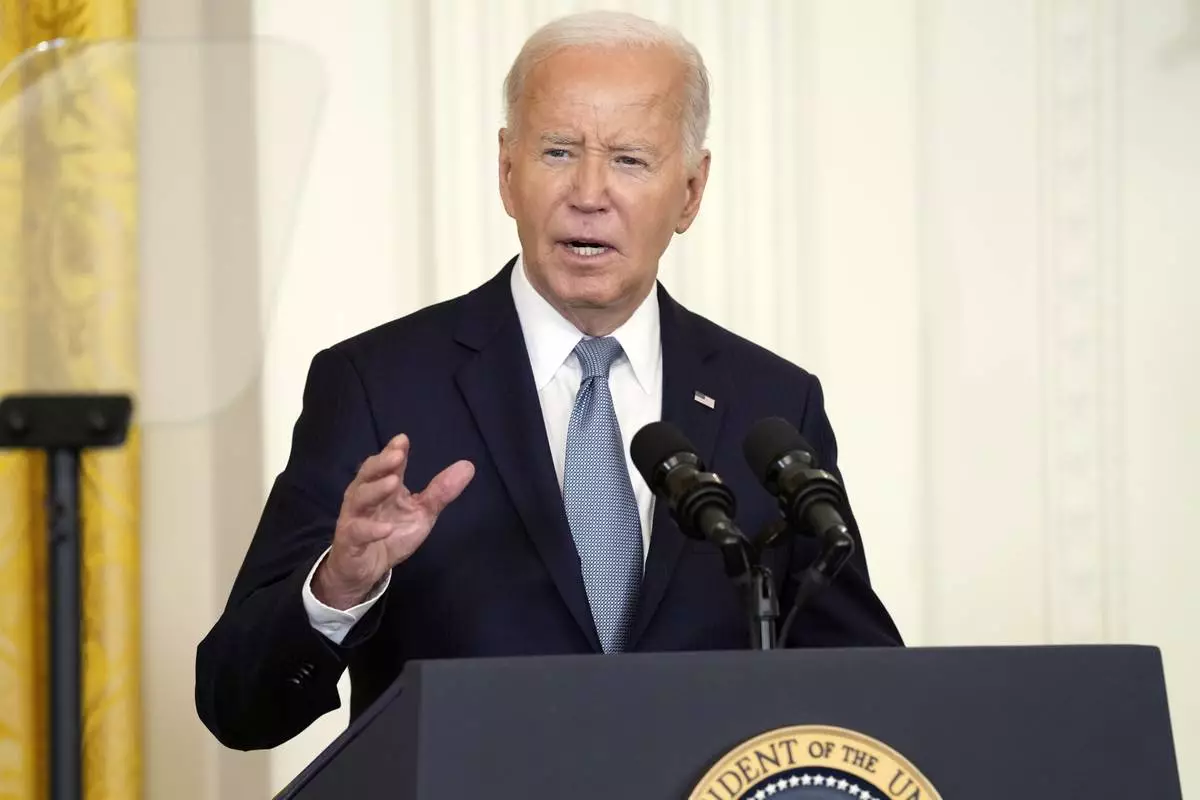
President Joe Biden speaks during a Medal of Honor Ceremony at the White House in Washington, Wednesday, July 3, 2024, posthumously honoring two U.S. Army privates who were part of a daring Union Army contingent that stole a Confederate train during the Civil War. U.S. Army Pvts. Philip G. Shadrach and George D. Wilson were captured by Confederates and executed by hanging. (AP Photo/Susan Walsh)
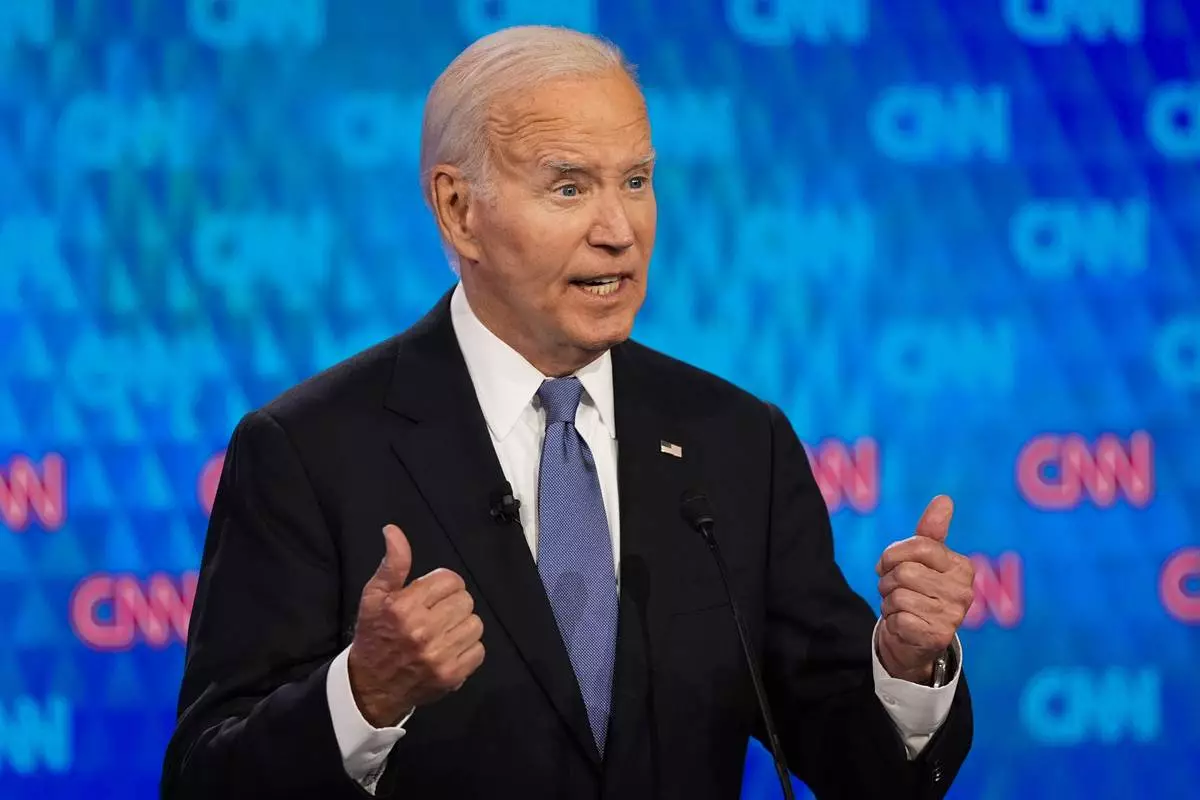
President Joe Biden, speaks during a presidential debate hosted by CNN with Republican presidential candidate former President Donald Trump, Thursday, June 27, 2024, in Atlanta. (AP Photo/Gerald Herbert)
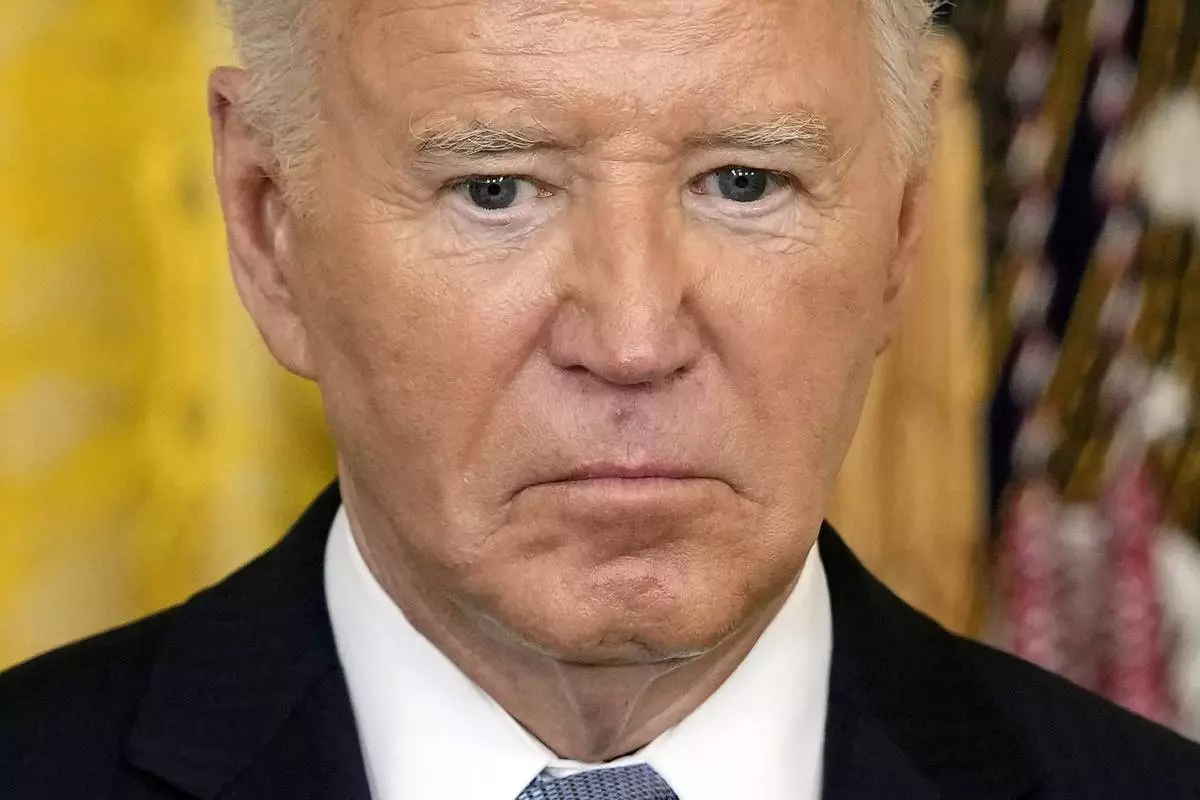
President Joe Biden listens during a Medal of Honor ceremony at the White House in Washington, Wednesday, July 3, 2024, posthumously honoring two U.S. Army privates who were part of a daring Union Army contingent that stole a Confederate train during the Civil War. U.S. Army Pvts. Philip G. Shadrach and George D. Wilson were captured by Confederates and executed by hanging. (AP Photo/Susan Walsh)
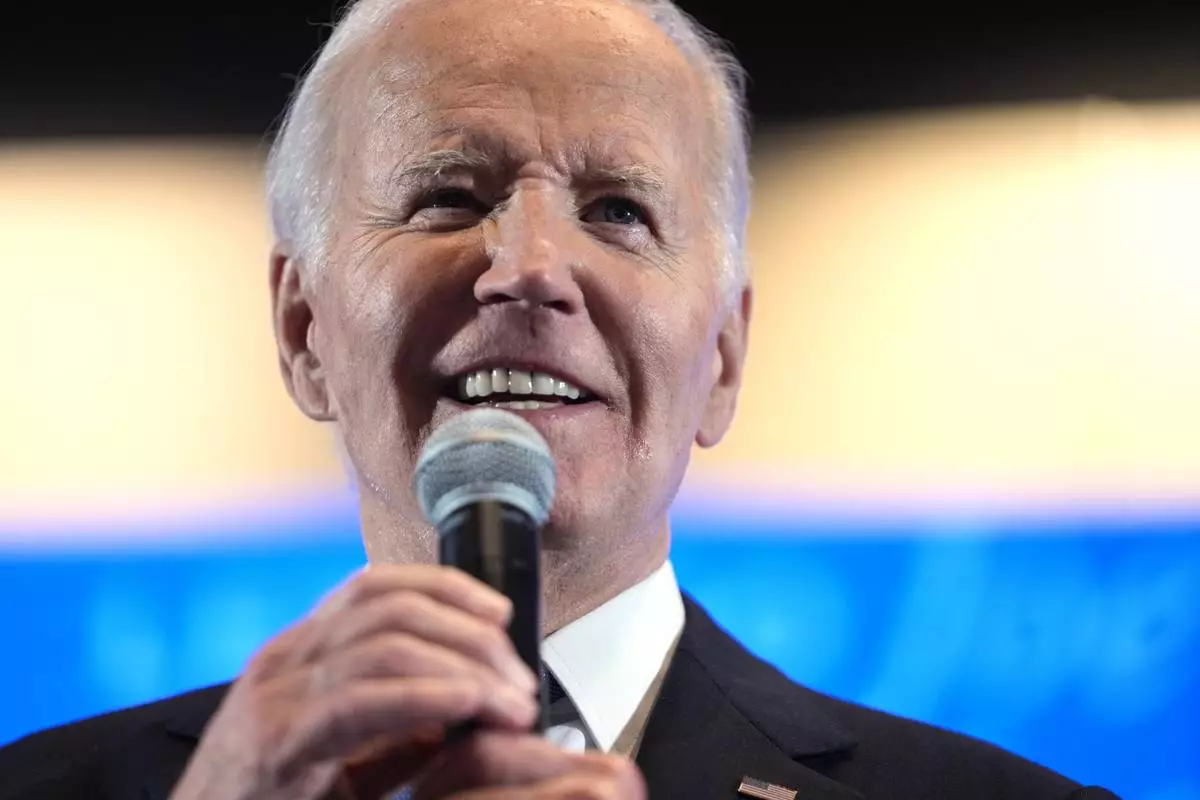
President Joe Biden speaks at a presidential debate watch party, Thursday, June 27, 2024, in Atlanta. (AP Photo/Evan Vucci)
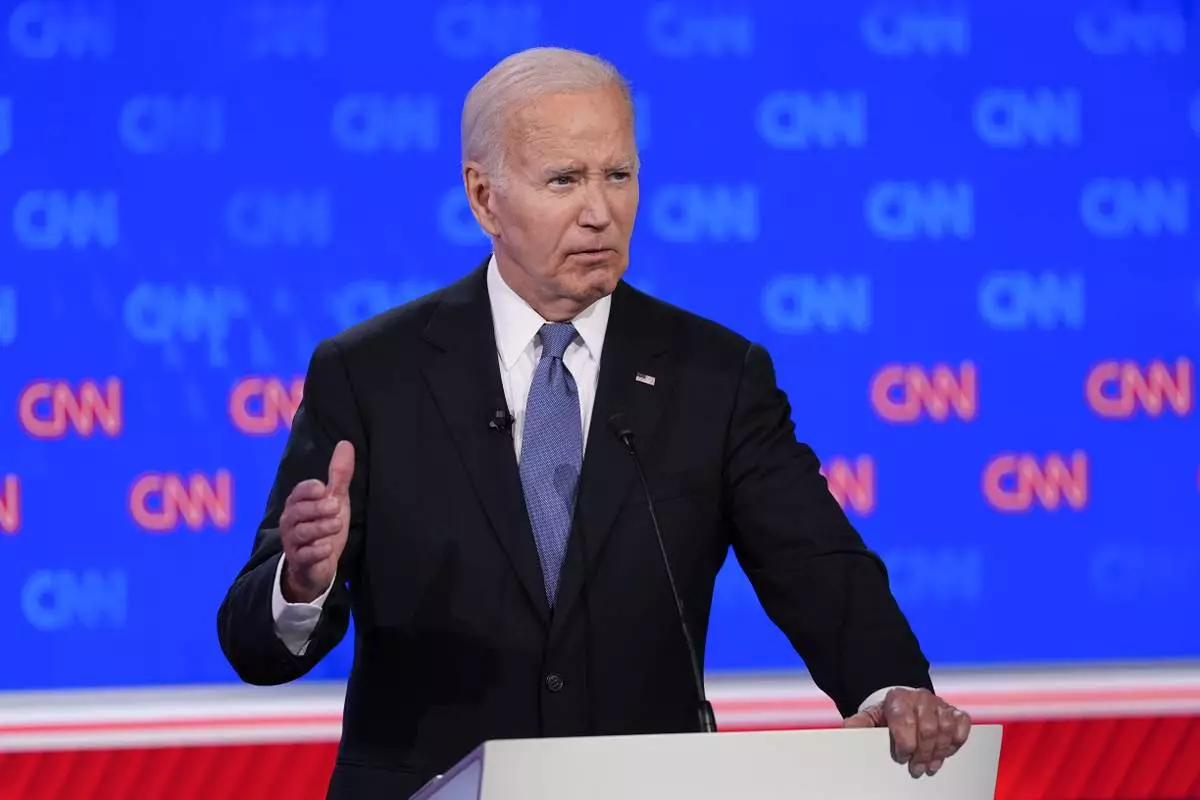
President Joe Biden speaks during a presidential debate with Republican presidential candidate former President Donald Trump, Thursday, June 27, 2024, in Atlanta. (AP Photo/Gerald Herbert)




